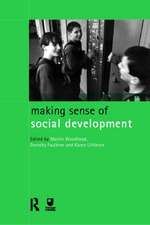Interthinking: Putting talk to work
Autor Karen Littleton, Neil Merceren Limba Engleză Hardback – 20 aug 2013
Written in an accessible and jargon-free style, Interthinking: putting talk to work explores the growing body of work on how people think creatively and productively together. Challenging purely individualistic accounts of human evolution and cognition, its internationally acclaimed authors provide analyses of real-life examples of collective thinking in everyday settings including workplaces, schools, rehearsal spaces and online environments.
The authors use socio-cultural psychology to explain the processes involved in interthinking, to explore its creative power, but also to understand why collective thinking isn’t always productive or successful. With this knowledge we can maximise the constructive benefits of our ability to interthink, and understand the best ways in which we can help young people to develop, nurture and value that capability.
This book will be of great interest to academic researchers, postgraduates and undergraduates on Education and Psychology courses and to practicing teachers. It will also appeal to anyone with an interest in language, creativity and the role of psychology in everyday life.
| Toate formatele și edițiile | Preț | Express |
|---|---|---|
| Paperback (1) | 286.45 lei 3-5 săpt. | +14.08 lei 7-11 zile |
| Taylor & Francis – 16 aug 2013 | 286.45 lei 3-5 săpt. | +14.08 lei 7-11 zile |
| Hardback (1) | 997.77 lei 6-8 săpt. | |
| Taylor & Francis – 20 aug 2013 | 997.77 lei 6-8 săpt. |
Preț: 997.77 lei
Preț vechi: 1216.79 lei
-18% Nou
Puncte Express: 1497
Preț estimativ în valută:
190.95€ • 195.55$ • 158.84£
190.95€ • 195.55$ • 158.84£
Carte tipărită la comandă
Livrare economică 18 martie-01 aprilie
Preluare comenzi: 021 569.72.76
Specificații
ISBN-13: 9780415675529
ISBN-10: 0415675529
Pagini: 144
Ilustrații: 6 b/w images, 3 tables, 2 halftones and 4 line drawings
Dimensiuni: 156 x 234 x 234 mm
Greutate: 0.38 kg
Ediția:New.
Editura: Taylor & Francis
Colecția Routledge
Locul publicării:Oxford, United Kingdom
ISBN-10: 0415675529
Pagini: 144
Ilustrații: 6 b/w images, 3 tables, 2 halftones and 4 line drawings
Dimensiuni: 156 x 234 x 234 mm
Greutate: 0.38 kg
Ediția:New.
Editura: Taylor & Francis
Colecția Routledge
Locul publicării:Oxford, United Kingdom
Public țintă
Postgraduate and UndergraduateCuprins
1. Understanding interthinking; 2. Talk and interthinking at work; 3. Interthinking and the performance arts; 4. Digital technology and interthinking; 5. Language and the process of thinking collectively
Notă biografică
Karen Littleton is Professor of Psychology in Education at The Open University, where she currently directs the Centre for Research in Education and Educational Technology. In 2010 she became Editor of Routledge’s Psychology in Education book series.
Neil Mercer is Professor of Education and Chair of the Psychology and Education Group at the University of Cambridge, having previously been Professor of Language and Communications at the Open University. In 2011 he became Vice-President of the Cambridge college Hughes Hall.
Neil Mercer is Professor of Education and Chair of the Psychology and Education Group at the University of Cambridge, having previously been Professor of Language and Communications at the Open University. In 2011 he became Vice-President of the Cambridge college Hughes Hall.
Recenzii
'The authors have pulled off the wonderful trick of presenting a genuinely innovative framework of understanding in a lucid, elegant manner. This is a cleverly interwoven contribution to theory and practice.' - Julia Gillen, International Journal of Educational Psychology
"The authors have pulled off the wonderful trick of presenting a genuinely innovative framework of understanding in a lucid, elegant manner. This is a cleverly interwoven contribution to theory and practice." - Julia Gillen, International Journal of Educational Psychology
"Their book brings together an impressive body of work spanning 20 years to explore how people (children and adults) work together to solve problems and create new understandings, termed 'interthinking'. It is framed within sociocultural theory, has roots in Vygotsky's developmental theory and brings together culture, social interaction, language and cognition. The authors develop this account of individual development to provide what they call a 'preliminary sketch' of collective thinking in groups." - Jane Barrett, The Open University, PLAT13(2)
"The authors have pulled off the wonderful trick of presenting a genuinely innovative framework of understanding in a lucid, elegant manner. This is a cleverly interwoven contribution to theory and practice." - Julia Gillen, International Journal of Educational Psychology
"Their book brings together an impressive body of work spanning 20 years to explore how people (children and adults) work together to solve problems and create new understandings, termed 'interthinking'. It is framed within sociocultural theory, has roots in Vygotsky's developmental theory and brings together culture, social interaction, language and cognition. The authors develop this account of individual development to provide what they call a 'preliminary sketch' of collective thinking in groups." - Jane Barrett, The Open University, PLAT13(2)
Descriere
Written in an accessible and jargon-free style, Interthinking: putting talk to work explores the growing body of work on how people think creatively and productively together. Challenging purely individualistic accounts of human evolution and cognition, its internationally acclaimed authors provide analyses of real-life examples of collective thinking in everyday settings including workplaces, schools, rehearsal spaces and online environments.
The authors use socio-cultural psychology to explain the processes involved in interthinking, to explore its creative power, but also to understand why collective thinking isn’t always productive or successful. With this knowledge we can maximise the constructive benefits of our ability to interthink, and understand the best ways in which we can help young people to develop, nurture and value that capability.
The authors use socio-cultural psychology to explain the processes involved in interthinking, to explore its creative power, but also to understand why collective thinking isn’t always productive or successful. With this knowledge we can maximise the constructive benefits of our ability to interthink, and understand the best ways in which we can help young people to develop, nurture and value that capability.



















